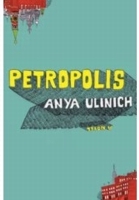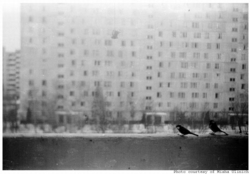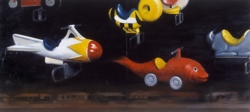 Anna Sergeievna Ulinich did not necessarily set out to be a writer. She did not necessarily set out to be a Soviet immigrant in America either, but the experience was thrust upon her, and now she has emerged into the public having written a book.
Anna Sergeievna Ulinich did not necessarily set out to be a writer. She did not necessarily set out to be a Soviet immigrant in America either, but the experience was thrust upon her, and now she has emerged into the public having written a book.
Sasha Goldberg, the character at the center of Anya Ulinich’s Petropolis, did not set out to be much of anything. She was enrolled by her mother in drawing classes, but only got accepted to the art academy in Moscow through a series of lies that her mother, Lubov Alexandrovna Goldberg, had orchestrated and not exposed even to her daughter. By that point, at the age of fifteen, Sasha had already been attacked perpetually by school kids for her strange looks, abandoned by her father five years before, and just given birth to a daughter, Nadia, of whom Lubov immediately took charge, designating her Sasha’s “sister.”
Lubov Alexandrovna repeatedly speaks of the intelligentsia – a word that defies class (or tries to work around it). The Goldbergs are part of one of the lowest classes – though not as poor as the father of Sasha’s child, eighteen year old Alexey, who lives with his sister and parents in the town dump. Yet within that low class Sasha’s mother is the town librarian, and as such tries to maintain some of the “traditions” – or strict social prerequisites – that go with an enlightened life, regardless of its cost.
 Neither Sasha Goldberg nor Lubov Goldberg nor even Sasha’s father Victor Goldberg (who crowns the trio with their Jewish-affiliated identity) is Jewish. Victor is a half-Russian, half-African love child adopted by Jewish members of the nomenklatura (the privileged upper echelon of Soviet professionals and bureaucrats). So that with his dark skin and afro, both of which he passes on to Sasha, he represents a sort of all-around foreign yet socially embedded element. Lubov (meaning “Love”) is the granddaughter of a Wife of the Enemy of the People, sent to Siberia a year after her husband died. She, like Nadia, was taken and raised by her grandmother when her mother proved unfit for the responsibility – in this case not because she was too young, but because she was a complete drunk.
Neither Sasha Goldberg nor Lubov Goldberg nor even Sasha’s father Victor Goldberg (who crowns the trio with their Jewish-affiliated identity) is Jewish. Victor is a half-Russian, half-African love child adopted by Jewish members of the nomenklatura (the privileged upper echelon of Soviet professionals and bureaucrats). So that with his dark skin and afro, both of which he passes on to Sasha, he represents a sort of all-around foreign yet socially embedded element. Lubov (meaning “Love”) is the granddaughter of a Wife of the Enemy of the People, sent to Siberia a year after her husband died. She, like Nadia, was taken and raised by her grandmother when her mother proved unfit for the responsibility – in this case not because she was too young, but because she was a complete drunk.
 Lubov does a difficult, but from her point of view necessary, motherly thing: alienating Sasha from her own newborn daughter in the hopes that Sasha will be propelled to make a better life for herself at Moscow’s art institute. In fact, Sasha is propelled far beyond Moscow, and through a bridal agency meets and gets engaged to an American man. She moves with him to Arizona using a student visa from a non-existent university in Utah, but it doesn’t take her long to abandon her commitment and enter the wilderness of America as an illegal immigrant. Thanks to other Russian Jewish immigrants she meets along the way, she manages to travel to Chicago, becoming a modern indentured servant in the suburbs, and finally escaping to Brooklyn in order to face her father.
Lubov does a difficult, but from her point of view necessary, motherly thing: alienating Sasha from her own newborn daughter in the hopes that Sasha will be propelled to make a better life for herself at Moscow’s art institute. In fact, Sasha is propelled far beyond Moscow, and through a bridal agency meets and gets engaged to an American man. She moves with him to Arizona using a student visa from a non-existent university in Utah, but it doesn’t take her long to abandon her commitment and enter the wilderness of America as an illegal immigrant. Thanks to other Russian Jewish immigrants she meets along the way, she manages to travel to Chicago, becoming a modern indentured servant in the suburbs, and finally escaping to Brooklyn in order to face her father.
The Very Bottom of American Poverty Trained as a painter throughout her childhood and young adult life – in Moscow (before leaving the USSR at the age of seventeen), in Chicago (where she attended the Art Institute of Chicago), and at UC-Davis (where she received an MFA in painting) – Ulinich eventually came to mix her earlier visual concerns with ongoing literary ones. These include symbolic image confrontations of old iconoclasts (such as Marx) with new icons (such as Big Bird), reuse of old Soviet negatives, and narrative tendencies with political and personal history as well as the form and function of memory. She explains:
What I like about books versus art is that there’s actually a market for books, whereas with art it’s a very artificial market. There’s an institutional market, and a private gallery one, and maybe a few others, but it’s not like in the olden days, when everyone wanted to have their portrait painted. You can’t really feed yourself as a painter unless you’re a star, and with books it’s much different. There are actually people buying these little things that don’t cost too much.
 Anya Ulinich is Jewish, and not the daughter of drunks or teenagers. She grew up on the outskirts of Moscow, and though her father told stories of “antisemitic bastards who beat him for being Jewish, the bastards I went to school with weren’t with it enough to be antisemitic.” Ulinich elaborates:
Anya Ulinich is Jewish, and not the daughter of drunks or teenagers. She grew up on the outskirts of Moscow, and though her father told stories of “antisemitic bastards who beat him for being Jewish, the bastards I went to school with weren’t with it enough to be antisemitic.” Ulinich elaborates:
They’d never seen a Jew. So yes, I got abused for my ethnic looks, but my derogatory nickname was Armianka (Armenian). But as soon as you have brown hair you’re an ethnic minority in those parts, which were full of hard-drinking working-class Russian people. Most girls had a braid down to their butt that was all blond.
In regards to her mother, Ulinich tells the story of how she actually managed to get into the arts academy in Moscow:
I finished high school when I was sixteen, and even though I was the equivalent of a valedictorian – I had this ridiculous little gold medal in a box, which wasn’t real gold, of course, and had this little Lenin head on it – and even with straight A’s I couldn’t get into college, into this very prestigious art school, the Stroganovskaya Industrial Art Institute, which took only a few people per department per year. You have to have your grandpa be a general in the KGB, or you have to pay a lot to ‘tutors’ who also happened to be on the admissions committee. But my parents were kind of started out late with that, so I wasn’t even invited to do the first round test. My mom then bribed a personnel manager and I got a job there as a secretary. Which, at sixteen, I was the world’s worst secretary – typing with one finger, missing days at work because I didn’t feel like going in. Everyone in the college – every cleaning lady, everyone who worked in the coat-check, all the support staff – we were all hopeful students. Even though I’d hoped to do ceramics, I ended up having to apply for industrial design, which was a joke because we didn’t have any computers. We didn’t even have enough chairs. But the dean was my boss, and my mom chummed up to her.
The personnel manager was an ex-KGB man who also taught history, and everyone, even the academics, was under his power. So on national holidays, the entire staff would have to march into his office themselves and deliver him a bottle of hard liquor. He’d get really drunk and call all the girls to his office and have these sort of heart-to-heart talks with them, and he was this giant, seventy-year-old toad of a man. But I refused, I was too shy – I said, ‘Mom, I just can’t go to Oblizyn (which means ‘licked-all-over’) with this bottle of liquor.’ So my poor mom had to take time off work to schlep the bottle of liquor to Oblizyn on national holidays. And after all that I got into college, and was a student there for five days before we left to the US.
 There’s both a parallel and radical difference between Soviet Leninist-Marxist education, which ideologically frames one’s literal life activity, and American art school education, where Marx and Marxist-leaning writers are taught as vital cultural commentators. But whether or not Ulinich paid attention to her Soviet lessons on Marx or her American art theory courses on Walter Benjamin, the experience of class is something that came most acutely into focus in the United States:
There’s both a parallel and radical difference between Soviet Leninist-Marxist education, which ideologically frames one’s literal life activity, and American art school education, where Marx and Marxist-leaning writers are taught as vital cultural commentators. But whether or not Ulinich paid attention to her Soviet lessons on Marx or her American art theory courses on Walter Benjamin, the experience of class is something that came most acutely into focus in the United States:
Having been at the very bottom of American poverty, I have a very strong class consciousness. Aside from that, as soon my life becomes easy, I’m like, ‘Must add stress.’ So I decided to go to grad school and get pregnant at the same time, and showed up there with a six month old baby. I’d take care of her all day, and as soon as my husband came home from work at four in the afternoon, I went to school till two in the morning.
I had this instructor who was a 60’s feminist, who just had her kid in her 40’s and immediately put the kid into full-time daycare. And she gave me the hardest time, saying, ‘Your work is more important. You have to put your kid in daycare. You’re not painting enough.’
But I felt like it was pure self-indulgence – was I supposed to put my ‘creative self-indulgent expression’ before of my baby? I wasn’t making any money with painting, and I can’t see the situation without it coming through the prism of class. And putting her in daycare to scream her antisocial little head off, while I paint my inner world – it just didn’t work for me.
A mother of two, Ulinich is socially aware and concerned, voicing ideals such as daycare for teenage moms, stronger community support in lower class neighborhoods, and healthcare reform:
My father [who lives in Arizona] keeps losing jobs to factories that move across the border to Mexico, and with it goes his healthcare. But it’s to the point now where the turnover is so high that he tells my mom not to use the insurance at the doctor, and to just pay cash, because if he loses his job the insurance at his next job will know about the preexisting conditions. And so many people go without coverage all together. You go to the emergency rooms and see people with the flu, or with strep throat, because they don’t have a doctor, and this is the only way they can get medical attention and prescriptions.
====
Ulinich also speaks of Russia’s diversity resulting from the current influx of refugees and migrant workers who have made their way to Moscow. But the response in Russia is hostile at best, and it is not unheard of for young Central Asian women to be knifed to death on the outskirts of large cities by young nationalist gangs:
America is still a racist society, made worse by the stubborn connection between race and class, a connection perpetuated by the U.S. government’s social policies allowing for multi-generational poverty, unequal education, and ever deepening social stratification. But there are degrees of imperfection. People here generally acknowledge that racism is evil, and racist language is a social taboo. In the Soviet Union, the state propaganda paid a lot of lip service to the ‘friendship of peoples,’ but in practice, Russian society was, and is, racist. Riding a bus in Moscow, I heard two men in suits openly and loudly debate weather or not they would trust an Azerbaijani. A family friend lamented not having a baby with a Jew because Jews, cross-bred with ‘pure Russian blood,’ make smart babies. Things such as vanity, generosity, trustworthiness, secrecy and violent behavior are discussed as ethnic traits. Ethnic jokes are all the rage.
An ethnic identity, like any identity, should be an individual’s private choice. In my opinion a person should own and define their personal identity. If they choose to culturally, or religiously, identify with a group, fine. Unfortunately, for now, if you look a certain way, the ethnic, or racial identity – as well as an accompanying set of assumptions – is hoisted upon you. In my opinion, the U.S. is closer to the point when that will not be the case. Russia, which recently began to round up schoolchildren with Georgian last names, has a very long way to go.
 Owning the American Undream In thinking and writing about Ulinich’s novel, it is difficult not to step into the potholes of various politically sensitive names and terms: “teenage mother,” “negro” – part of Russian racist vocabulary, where “Nyeger” or “Negro” is the culturally appropriate to call a Black person –”pothead,” and “physically disabled.” The book is fraught with dire circumstances and impolite reactions and conflicting cultural traits. Ulinich writes about Russian racism together with immigration in America; about class-consciousness in America and materialism in Russia.
Owning the American Undream In thinking and writing about Ulinich’s novel, it is difficult not to step into the potholes of various politically sensitive names and terms: “teenage mother,” “negro” – part of Russian racist vocabulary, where “Nyeger” or “Negro” is the culturally appropriate to call a Black person –”pothead,” and “physically disabled.” The book is fraught with dire circumstances and impolite reactions and conflicting cultural traits. Ulinich writes about Russian racism together with immigration in America; about class-consciousness in America and materialism in Russia.
Ulinich appears to have equal interest and investment in what she has seen in her American life as in what she remembers of her Russian one, faithfully portraying both Russian and American behaviors, yet she is also aware of the misperceptions between the two cultures. Rather than trying to create a mishmash characters with goofy language, or to regurgitate clichés of Russian beauties and American soul-searchers, she works to redraw the separating coexisting cultural lines. Ulinich has been a good student of America, has learned well its social mores – challenging some, upholding others – but has also held in her memory the vivid vision she acquired in the USSR.
Sasha Goldberg, her protagonist, is constantly amazed by and critical of America and the form of freedom (and ignorance) felt and projected by the people with whom she deals. From the philanthropic adopted guardian to the pothead musician boyfriend, Sasha holds against people their inability to be critical of the thing they are doing. Their forthrightness underlines their lack of alternative, negative, or counter-working perspective. Their sense of conflict is undermined by their fixation on the main goal or activity that defines them. They are hypocritical in the very basis of their lives – in the very way they greet each other. As Ulinich says:
It really rubs Russians the wrong way. Am I using a stereotype or am I not? And I’m speaking from my and my family’s experience. It rubbed us the wrong way when you asked someone who’s obviously unhappy how they’re doing and they say ‘fine.’ Because they’re obviously not fine. And we would say they’re hypocritical. This sort of politeness struck us as hypocrisy because we come from a much grumpier place.
Ulinich uses transliterated Russian words throughout the book, and takes the liberty not to explain them all directly. At the art academy, Sasha is chided for drawing babskie shtuchki (loosely translatable as “chic’s stuff”) and then is asked “What’s next? Fairies? Little angels? Stepashka the Bunny?” Context fills in the lack of literal understanding, while those who understand Russian can appreciate a memory of the language. For a Russian speaker it’s an expressive moment, a way to enter the intimacy of that language while remaining in the exile of the Latin alphabet; for an English speaker, it is perhaps a reminder that underneath the seemingly understandable prose is a parallel one that is totally incomprehensible.
In her writing Ulinich calls forth images and symbols from various cultural and physical environments through a voice that can be both soft and daring. Whether it’s something that started in her childhood, during the years of Soviet art training, after her conceptual, print, and collage work as an undergrad or perhaps during her more concentrated years of large iconic paintings as a grad student, Ulinich has proven herself a strong landscape artist in words. The book’s first paragraph is a landscape, perfectly envisaged, balancing humorous and precise details. And as long as Sasha Goldberg is moving, the reader glides and sees with her a series of microcosms made engaging by her physical and emotional alienation.
There is a strong sense throughout the book that Ulinich enjoys weaving personal narratives and histories. “Art and narrative have a conflicted relationship,” she says. “It was a relief to be able to just sit down and write a story.” It is also something she has a knack for, and which she has not yet fully explored. In a few distinct chapters throughout Petropolis, Ulinich lets go of the close third-person following Sasha and explores other characters – Lubov her mother, Victor her father, Heidi his American wife, Mr. Tarakan the Jewish philanthropist – and in those sections another Ulinich emerges, one who can pen the tight relationship between a character’s personality and behavior and yet still can step away from their more comic purpose. These are welcome interjections that take the book beyond the scope of a coming-of-age story to that of a book about breathing characters who have made difficult singular choices that have shaped and complicated their lives.
Like the hybrid language she uses, Ulinich’s concerns are also shaped by experience both in Russia and America, making it difficult to say that the book belongs more to one culture than another. And while book is utterly American in its subject – self-realization – it is tempered by a kind of Soviet-realist treatment: the realization is that of a grumpy young single mother who cleans apartments for a living and has a handicapped boyfriend.
Ulinich writes at a moment toward the end of the book: “You’re my lover, Sasha thinks to herself in an in-between language. You’re my daughter.” It is a moment of ownership and of the fulfillment of American ideals, yet with a twist that plays on their expected form. The main character is chubby, the lover is in a wheelchair, the daughter is a blond immigrant, creating a conscious comic dissonance. In this the book may fall on the American side, as its full political implications can be appreciated only in the US, where more people may take such details seriously. Despite the backdrop of American poverty, drugs, and other socioeconomic abuses and problems, it is still possible to see this story as proof that with hard work, open-mindedness, and some luck, social equality can be achieved by a person of any form. In Russia, the idea of a handicapped person living a free public life is so far from reality that the book would probably read like a gross (in both senses of the word) joke.








I believe that may be a captivating element, it made me think a bit. Thanks for sparking my pondering cap. Now and again I get so much in a rut that I simply really feel like a record.
I as well as my friends have been reading through the best solutions located on your website and then at once developed an awful feeling I never thanked you for those tips. The men came so very interested to read them and have now unquestionably been having fun with those things. I appreciate you for actually being very helpful and then for obtaining variety of ideal themes millions of individuals are really wanting to discover. Our honest apologies for not saying thanks to you earlier.